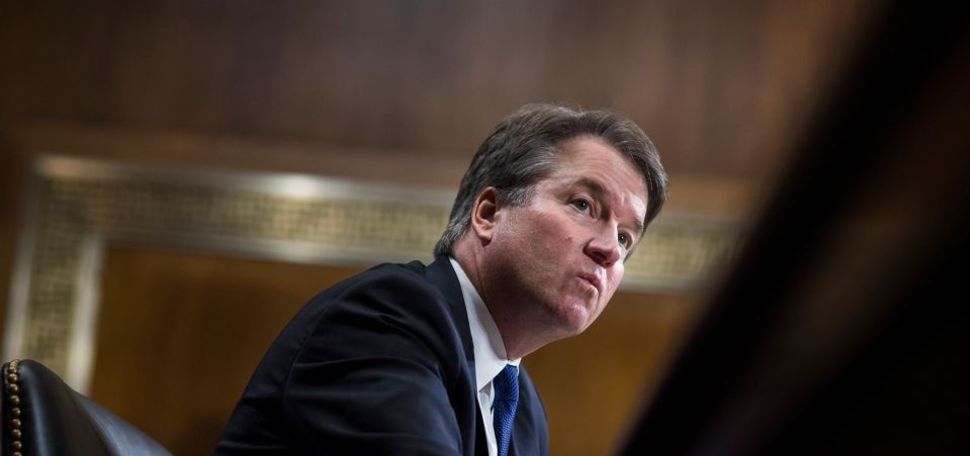Is Brett Kavanaugh Every American Man? Let’s Hope Not.

Image by Getty Images
If Christine Blasey Ford represents every woman who has been assaulted, humiliated, demeaned or disbelieved — and the reaction to her extraordinary congressional testimony on Thursday suggests that she does — then is the corollary true?
Does Brett Kavanaugh represent every man?
This is the challenge before America today. Of course, it is unfair and inaccurate to tarnish half the population with his behavior at Thursday’s hearing, since even most entitled white men cannot get away with yelling at, crying before and arguing with United States senators on national television, nor would they want to act that way.
But as Kavanaugh persists without apology in his quest for the U.S. Supreme Court robes he would get to wear for the rest of his life, I see in him a man who embodies the angry, aggrieved persona that has come to represent a dominant aspect of the American male character, especially in the Trump era. It will be up to all the good men out there to confront this ugly side and to write a different narrative for themselves.
Because I’m just not sure how much more women can do. Despite the enormous strides made in just the last year with the #MeToo movement, even those who express deference to the status quo still have difficulty overturning the status quo.
That was driven home the moment Blasey Ford asked of Republican Sen. Chuck Grassley, the snarling, aggressively defensive chair of the Judiciary Committee, “Does that work for you as well?”
“I’m used to being collegial.”
Of course she is. With those few words, Blasey Ford reflected every woman’s innate desire to please the male power structure arrayed before her, to get along with a smile and a nod, to suppress her own needs — and her own trauma.
This eagerness to please was threaded through her testimony, expressed in a still, small voice with genuine hesitation and, one sensed, a lifetime of practice. She almost seemed embarrassed by the praise heaped on her by those puffed-up senators, some of whom clearly were hoping that her sacrifice and strength would redound back to them.
But it doesn’t work that way. Instead, a woman like Blasey Ford, like so many women, was forced to try and assist the power structure rather than storm it. How many times did she say, “I wish I could be more helpful”?
When Grassley demanded that she acknowledge his supposed willingness to travel to California to interview her — instead of requiring her to take an anxiety-laden trip to Washington — she replied that she would “be happy to host you.”
I half expected her to proffer him an invitation for dinner at her home.
But of course, she isn’t living there now. Blasey Ford and her family were forced to move, and move again, because of the disgusting threats against them ever since her name unwittingly surfaced during Kavanaugh’s rushed confirmation hearings — just one of the many sacrifices she has had to make in these last excruciating months.
Kavanaugh and his family have sacrificed much, too, and it was impossible to look at the agony on his wife’s face — constantly visible in the background as he spoke — without sympathizing with their pain and bewilderment. But while Blasey Ford relayed her situation without complaint, Kavanaugh described his with relentless fury, blaming anti-Trump anger, the Clintons and the Democratic senators before him for what he deemed “a national disgrace.”
“[M]y family and my name have been totally and permanently destroyed by vicious and false additional accusations,” he reminded them again and again.
When he claimed that his opponents were “lying in wait” to pounce in an orchestrated last-minute conspiracy that somehow was able to persuade three different women to upend their own lives, he sounded just like the man who nominated him. Kavanaugh lashed out with such Trumpian resentment and partisan belligerence that many now say his service on the high court, should he get there, will be forever tainted.
Is this the epitome of American masculinity? Hurrah for anyone who defends his family with such passion, who references his daughter’s prayers, who laments that he won’t be able to coach junior sports anymore.
But the fact that Kavanaugh, under questioning, admitted that he did not even listen to Blasey Ford’s testimony tells you that this is a man who did not care about another human being’s suffering, whether or not he was the cause.
It was the same lack of empathy illustrated by Republican Sen. Lindsey Graham when a woman who said she had been raped confronted him in a Capitol hallway and he replied, “I’m so sorry but then you should go to the cops” before hurrying away.
She said afterward that all she wanted was to be heard. Fortunately, when two angry and tearful women similarly confronted Republican Sen. Jeff Flake in an elevator, he actually listened, his face a contorted grimace, his heart obviously open since shortly afterwards he called for an FBI probe into the new charges against Kavanaugh.
It is both fascinating and discouraging that Blasey Ford’s calm, deferential testimony did not prompt Flake to ask for further investigation, but a woman demanding “look at me when I’m talking to you!” did.
Perhaps if Kavanaugh had actually looked at Blasey Ford, he might have shown a more evolved side of the male character. He could still proclaim his innocence. He could still feel understandably aggrieved. But he would demonstrate the humanity and maturity of a true justice, male or female.
He’s not there yet, and neither is America.




















